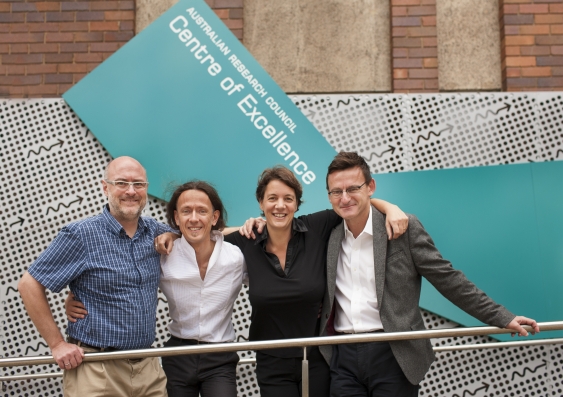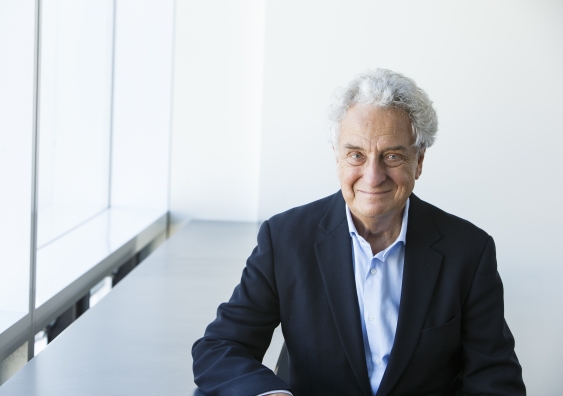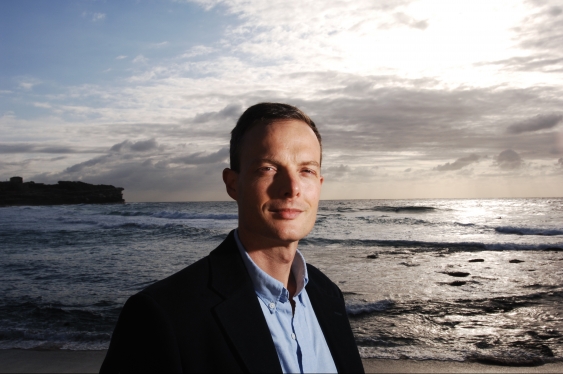UNSW has cemented its reputation as a leader in world-class research, winning $91 million from the federal government for three national centres of excellence in quantum computing, climate change and the ageing population.
The federal Minister for Education and Training, Senator Simon Birmingham, today announced a total of nine Australian Research Council (ARC) Centres of Excellence grants for research to begin in 2017. UNSW won three of the four grants awarded to NSW.
The ARC Centres of Excellence program is one of the most prestigious government funding schemes, providing resources for up to seven years and bringing together world-class, internationally competitive teams to investigate and find solutions to problems of national priority.
“The $283.5 million from the Turnbull Government for these new Centres of Excellence represents an investment in Australia’s future,” Minister Birmingham said.
“Previous Centres of Excellence have been the birthplaces of research that has changed lives. They are incubators for the advancements that we don’t even know we need yet."
By any measure, these results are outstanding, placing UNSW at the cutting-edge of innovative research in Australia.
The UNSW-headquartered ARC Centre of Excellence for Quantum Computation and Communication Technology, led by Scientia Professor Michelle Simmons, was awarded $33.7 million to continue its development of the world’s first quantum computer in silicon. The new technology is expected to provide a strategic advantage in a world where information and information security are of paramount importance. The Centre will bring together eight Australian universities and more than 35 international partners and end users in the fields of quantum computing and quantum communication.
The ARC Centre for Excellence for Climate Extremes, headed by UNSW Professor Andy Pitman, won $30.05 million for research into past and present climate extremes and to revolutionise Australia’s ability to predict them into the future. The research across five universities and multiple partner organisations including the Bureau of Meteorology and NASA is expected to make Australia more resilient to climate extremes and minimise risks to the Australian environment, society and economy. The Centre will build on the work of the existing ARC Centre of Excellence for Climate System Science.
And the ARC Centre of Excellence in Population Ageing Research, led by UNSW’s Scientia Professor John Piggott, received $27.25 million to continue and expand its investigations into the economic and social challenges of population ageing. The centre is a collaboration involving eight universities, including the University of Pennsylvania’s Wharton School, and multiple industry and government partners.
UNSW will also play a role in the fourth grant awarded to NSW, the ARC Centre of Excellence in Australian Biodiversity and Heritage, at the University of Wollongong. The Centre will track changes to Australia’s environment, examine the processes responsible and provide insights into how Australia can continue to adapt to change.
And UNSW scientists will contribute to two more Centres of Excellence: the new University of Melbourne-led ARC Centre of Excellence in Exciton Science and the ARC Centre of Excellence in Future Low-Energy Electronics Technologies, to be established at Monash University.
Climate extremes, population ageing and quantum computing are all areas that will have profound impacts on human life as we move deeper into the 21st century.
UNSW President and Vice-Chancellor Professor Ian Jacobs congratulated the successful teams. “By any measure, these results are outstanding, placing UNSW at the cutting-edge of innovative research in Australia.
“Climate extremes, population ageing and quantum computing are all areas that will have profound impacts on human life as we move deeper into the 21st century, and these major ARC grants will build on substantial pioneering work already undertaken by our research teams," he said.
“I congratulate all those involved for their efforts and their dedication. Each of these centres is doing work that reflects brilliantly the aims of our 2025 Strategy – to achieve academic excellence, to expand social engagement and to have global impact.”
Professor Nicholas Fisk, UNSW’s Deputy Vice-Chancellor Research, said the grants were “a tribute to the three teams involved, and a massive endorsement”.
“To be the only university in the country to gain more than one ARC Centre of Excellence grant – and then to pick up not two of these flagship grants, but three – really places us in the top league. This is real-world research of the very highest order, at once innovative and relevant, and aimed squarely at the enormous challenges facing the planet.”
A quantum future

UNSW Professors Sven Rogge, Andrea Morello, Michelle Simmons and Andrew Dzurak from the ARC Centre for Quantum Computation and Communication Technology.
The ARC Centre of Excellence for Quantum Computation and Communication Technology (CQC2T) will use its $33.7 million to build quantum processors “to potentially transform all industries dependent on computers”.
The Centre is a globally unique facility dedicated to the development of atomically precise devices in silicon. Its researchers are leading the international race to build the world’s first quantum computer in silicon and have developed technologies for manipulating matter and light at the level of individual atoms and photons.
CQC2T Director UNSW Scientia Professor Michelle Simmons said she was absolutely delighted the federal government had awarded seven more years of funding to ensure quantum information research in Australia remained world-leading.
“I am extraordinarily proud of all the Chief Investigators, researchers and students involved in our Centre proposal,” Professor Simmons said.
“This announcement by Minister Birmingham will bring together eight Australian universities and more than 35 international partners and end users in the fields of quantum computing and quantum communication – technology that will prove to be totally disruptive over the next decade and beyond.”
In December 2015, the federal government announced a $26 million investment in the Centre’s ground-breaking research as part of its National Innovation and Science Agenda. The Commonwealth Bank of Australia and Telstra also pledged $10 million each.
In April 2016, Prime Minister Malcolm Turnbull opened a new laboratory complex that doubled the capacity of the Centre’s UNSW headquarters.
Recent breakthroughs by Centre scientists and engineers include the creation of the world’s first single-atom transistor and the creation of the world’s first qubit based on the spin of a single electron on a phosphorus atom embedded in silicon. The Centre has also achieved the longest time qubits in the solid state, the world’s longest-lived quantum memory, and the ability to run small-scale algorithms on photonic qubits.
Our ageing population

Professor John Piggott, Director of the ARC Centre of Excellence in Population Ageing Research.
$27.25 million awarded to the ARC Centre of Excellence in Population Ageing Research (CEPAR) will allow staff to expand their research into one of Australia’s most pressing issues, said Centre Director UNSW Professor John Piggott.
“Population ageing is an issue of paramount importance to all; this is truly the ageing century,” he said.
“The research we will continue to undertake has the potential to transform Australia’s future. It supports a vision of Australia where economic growth is robust, the mature labour market is buoyant, health and social services are effectively and sustainably delivered, cognitive ageing is slowed as a result of meaningful work and social participation, outcomes for women in the workplace and in retirement are improved, and individuals are guided in decision making and financial risk management.”
Based at UNSW’s Business School, CEPAR was the first social science centre to receive Centre of Excellence funding, in 2011. It remains the only Centre of Excellence to be hosted by a business school.
Climate extremes

UNSW Professor Andy Pitman. Photo: Dan White
Climate extremes cost Australia up to $4 billion a year and will intensify over coming decades. The more-than $30 million awarded to the new ARC Centre of Excellence for Climate Extremes will allow researchers to engage in blue-sky research to discover processes that explain the behaviour of present and future climate extremes. It will use its researchers, data, modelling, collaboration, graduate program and early career researcher mentoring to transform Australia’s capacity to predict climate extremes.
“This is a fantastic opportunity to drive innovation at the intersection of high performance computing, massive data, maths, physics and climate science,” said UNSW Professor Andy Pitman, who will lead the Centre. “We are committed to delivering new science that directly helps our management of climate extremes including enhancing our ability to forecast how they will change in the future.”





